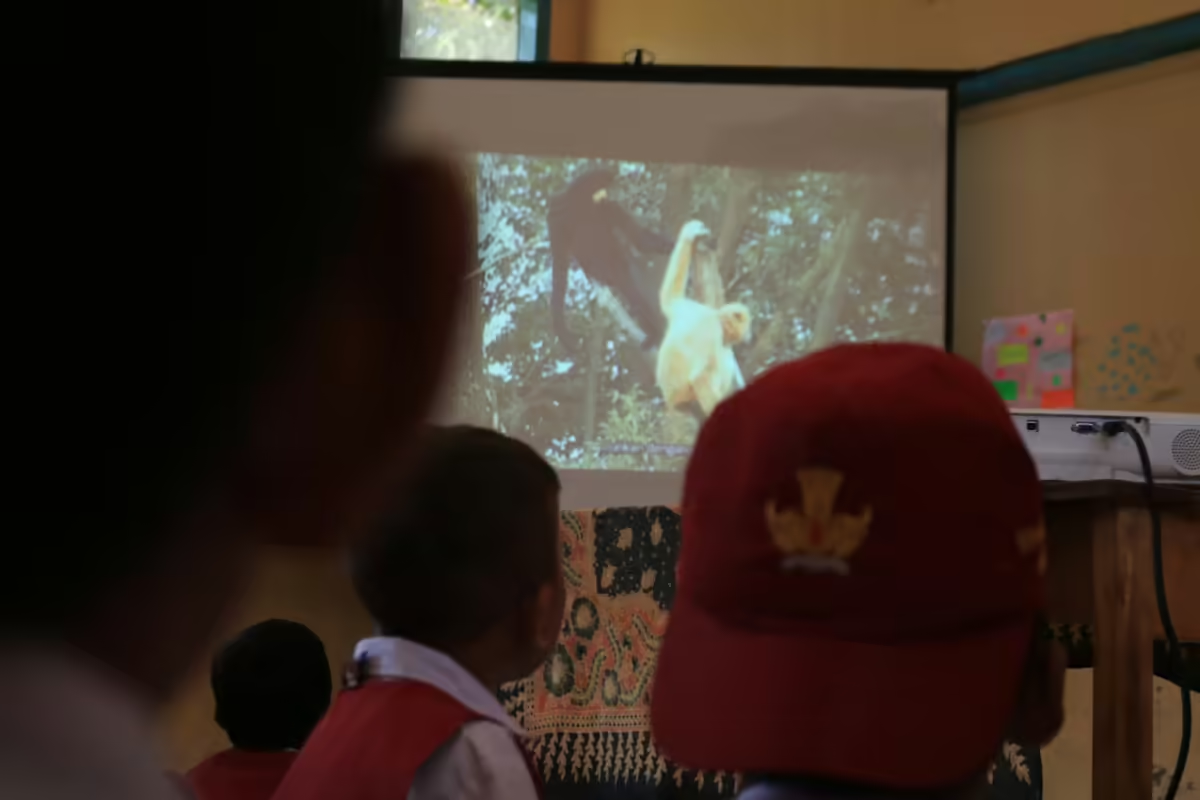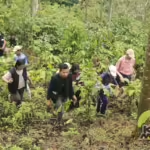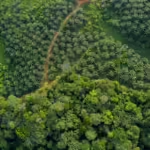“The biggest threat to endemic primates is poaching,” said Arif Destriad. Poaching also threatens the existence of the Javan gibbon.
The WALHI West Java team visited SD 4 Cikondang, Bunisari Village, Garut Regency, Monday (2/9/2024). This activity is indeed part of the routine carried out by WALHI West Java in an effort to preserve the environment. SD 4 Cikondang itself is one of the other educational houses located in Cisompet Village. The importance of preserving Javan gibbons from poaching was also conveyed.
Cisompet Village, Garut Regency is located in a mountainous area. This area is home to some animals, including the Javan Gibbon (Hylobates moloch), Javan Surili (Presbytis comata), and Long-tailed Monkey (Macaca fascicularis).
The population is diverse, in the calculations we got from Bunisari residents the ratio between Surili and Monkeys is around 10:9. While there are 8 Javan Gibbon species divided into 3 groups.
The potential that Cisompet has apart from endemic primates that live side by side with the community, another is the context of area management by local residents. This diversity gave rise to a community called Jasa Muda.
“We often face conflicts with wildlife hunters from outside the region, including the Javan Gibbon. Their actions threaten the survival of these rare animals,” said Wildan, one of the administrators of Jasa Muda, in an official statement.
Implementing environmental ecosystem-based education
Education is the first step in creating a cultured society. But often education is also politicized so that the substance of liberating individuals with their knowledge does not reach. Similar to the explanation of Ki Hajar Dewantara through the same attitude stating that education is the process of humanizing humans.
Reflecting from another perspective, the term Islam itself pumps up human responsibility as khalifatul al-ard. This means that human responsibility is not only between humans, but also the surrounding environment.
Exploring the world of children, we both have memories of the pleasure of playing and learning when outside. As a student, the reflection of space on the playground is impossible to forget. Instilling the concept of playing while learning is not a false pleasure. The surrounding flora and fauna attract our emotions as children to adapt to them. Similar to the position of SD 4 Cikondang.
Their adaptation to the surrounding area is close to the Javan Gibbon area. “Every morning I often hear the sound of the Javan Gibbon, uwok uwok uwok,” said Azrul, one of the students of Cikondang 4 Elementary School while he demonstrated the sound. Azrul’s house is not far from the school. With a distance of 20 steps, his parents’ simple house with a small shop is surrounded by shady trees, quite comfortable to use during school breaks.
Azrul grew up in this ecosystem. He clearly remembers how his father often told him about the primates he met. For him, meeting endemic primates in Cisompet was a common thing, but he couldn’t help but be happy when WALHI West Java came. For Azrul, the education on Javan Gibbons provided by the WALHI West Java Team was very interesting, “so I know what endemic primates are like, I thought Gibbons were everywhere,” he said.
Efforts to preserve Javan gibbons through community-managed areas
“At least they don’t reach the point of having to hunt endemic primates like Javan gibbons for their stomach needs. “Their greatest achievement is that they prohibit poaching that enters their area,” Arif Destriad hopes for the education they provide. Javan Gibbon Education brought by WALHI West Java through a community-managed area scheme.
This concept boils down to four points, namely: production system, consumption system, power system, and governance. In the issue of community-managed areas, participatory mapping needs to be emphasized. Its management is mandated to the community. Often in area-based management systems, the state does not involve local communities as area holders and are more knowledgeable about mapping their area.
The Javan Gibbon species is included in the category of endangered animals according to the International Union for Conversation of Nature (IUCN). In West Java, the conservation area for breeding is managed by The Aspinall Foundation. According to Mongabay data, the range of endemic primates for Javan Gibbons is 4,000. Javan Gibbons are full of poaching, even though in terms of ecosystem function, these primates have a great influence on the area.
Interestingly, the Javan Gibbon in the Cisompet area is not included in a conservation area, protected forest, or so on, but is included in a community forest area. Socially and culturally there are mystical things that are believed by the community, this is one form of their commitment to protecting the Javan Gibbon. Similar to other endemic primates that are also protected by the community. According to Apip as a member of Jasa Muda, this belief was obtained since he was a child, there are things that they believe.
“For example, in the past, if I ate fruit, I couldn’t eat it while walking, I had to stop first. I’m afraid there will be monkeys or primates who will want to see it. It’s as if if we have a new item but our neighbors don’t have it, there will be a form of envy. “Well, that also applies to primates in Cisompet,” said Apip when met at the hut near his house. For Apip, the ecosystem in Cisompet is already close to the community. The existence of a pluralistic ecosystem does not bother them, in fact it is respected.
“Just like in the past, there were monkeys who often disturbed people’s agricultural land, so we can’t be mean by our intentions, let alone saying harsh words. “In one incident in Cisompet, a monkey disturbed a resident’s land and then he said harsh words, the next day his land was even more invaded by long-tailed monkeys,” concluded Apip.
This proves that even though this area is not protected by the state, the close culture of the people is proof that these endemic primates survive there. The colony is quite large, and this has been going on for years. So the context of people’s management areas is encouraged to improve the welfare of the community. “Yes, it’s good if our stomachs are fulfilled, and primate matters can also be carried out,” concluded Arif.
- Get to know forest healing to relieve stress
 Forest healing activities aim to introduce psychological therapy that can be used to relieve various types of psychological symptoms.
Forest healing activities aim to introduce psychological therapy that can be used to relieve various types of psychological symptoms. - Fires, encroachment and land conversion are the causes of forest loss in West Kalimantan.
 A strategy that prioritizes sustainable development is needed to save West Kalimantan’s forests.
A strategy that prioritizes sustainable development is needed to save West Kalimantan’s forests. - Orangutan dies in resident’s garden, back wound caused by sharp object
 The death of the female orangutan was due to hunting or deliberate actions by humans, resulting in the killing of protected animals.
The death of the female orangutan was due to hunting or deliberate actions by humans, resulting in the killing of protected animals. - Loss of farmer life on industrial plantation in Kalimantan’s forest
 The forced eviction of gardens in Lelayang Hamlet to use industrial forest plantations left local residents with deep trauma.
The forced eviction of gardens in Lelayang Hamlet to use industrial forest plantations left local residents with deep trauma. - The struggle of indigenous women in Mentawai to get clean water
 Exploitation of the forests of South Pagai and North Pagai Islands in the Mentawai Islands has caused indigenous women to have difficulty obtaining clean water.
Exploitation of the forests of South Pagai and North Pagai Islands in the Mentawai Islands has caused indigenous women to have difficulty obtaining clean water. - The role of customary forests in reducing global warming
 Indigenous peoples are vulnerable to agrarian conflicts. The human rights perspective must be prioritized in devising policies and solutions.
Indigenous peoples are vulnerable to agrarian conflicts. The human rights perspective must be prioritized in devising policies and solutions.









